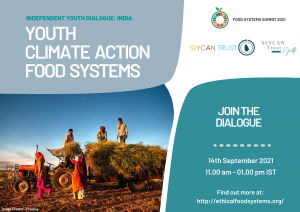Type of Dialogue
Convened by
Language of Dialogue Event
Date/time
To:
City
Geographical focus
Format
Please review the details below for registration information if available or contact the Convenor if you would like to attend.
Curator
Description
Food systems are an integral part of human life, providing nutrition, food security and livelihoods to people across the globe. The livelihoods of those dependent on food systems are at stake with climate change impacting crops, livestock, fisheries, and aquaculture, and current food systems contributing to climate change at the same time. Against this background, there is a clear need to transform food systems and make them more resilient, sustainable, and climate-friendly. Resilient food systems will ensure human well-being and health, help people adapt to climate change impacts, and secure their livelihoods, thereby reducing poverty.
Youth are key stakeholders in this transformation of food systems. The health, stability, and sustainability of food systems connect directly to the health, well-being, food security, nutrition, development, and financial stability of youth, with sustainable consumption and production as a prerequisite for a healthy and conducive environment for the young generation. It is vital that youth are a part of transforming food systems as they can contribute to the progress of the five action tracks and climate adaptation action.
Guided by five Action Tracks and four “levers of change,” the United Nations Food Systems Summit is aimed at transforming the way the world produces and consumes food as a part of the Decade of Action to achieve the Sustainable Development Goals by 2030. The five action tracks include ensuring access to safe and nutritious food for all, shifting to sustainable consumption patterns, boosting nature-positive production, advancing equitable livelihoods, and building resilience to vulnerabilities, shocks, and stresses.
Each action track aims at transforming food systems, focusing on access to safe and affordable food, changes in consumption and dietary patterns to reduce wasteful food patterns, optimal use of environmental resources to reduce stress on the environment and greenhouse gas emissions, the resilience of the workforce through social protection, and risk management for the stability of food systems.
As part of activities related to SLYCAN Trust’s annual Global Youth Forum on Climate Change (GYFCC,) the development of a strategy for youth engagement in climate action and policy, and in commemoration of International Youth Day 2021, SLYCAN Trust is organizing a series of independent dialogues on youth engagement for climate action and resilient food systems. The findings of these international and national events will be submitted to the United Nations Food Systems Summit and aim to contribute to the solutions identified under the Summit’s five action tracks, as well as be integrated to the draft youth climate action strategy being developed under the GYFCC.
This independent food systems dialogue for India is conducted by SLYCAN Trust in collaboration with Mr. Hemanth Byatroy from Bangalore. Mr. Byatroy is an Advocate for Animal Welfare and a Plant Biotechnologist with over seven years of experience in these fields. This event focuses on enhancing youth engagement and inclusion in climate action and food systems as well as identifying challenges faced by youth when it comes to building resilient food systems in India.
Objectives
- Enhancing youth engagement and inclusion in climate action and food systems
- Identifying key areas and entry points for youth engagement in climate action and innovative, youth-led solutions for resilient food systems
- Identifying challenges and barriers, gaps and constraints for effective youth engagement in climate action and food system transformation
- Discussing possibilities to scale up youth contributions and existing youth-led initiatives through innovative action
- Understanding the challenges of youth when it comes to food systems, youth engagement, and resilience


